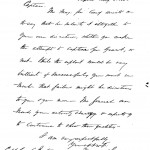by John Beauchamp Jones
JULY 6TH.—Yesterday evening we received Baltimore and New York papers with accounts (and loose ones) of the battle of Gettysburg. The Governor of Pennsylvania says it was “indecisive,” which means, as we read it, that Meade’s army was defeated.
The forces (Federal) are withdrawing from the neighborhood of this city, another indication that Lee has gained a victory. Dix has done but little damage. In retreating from HanoverCounty, he burnt the bridges to retard pursuit.
The “War Department Guard” have returned, my son among them, sun-burnt and covered with dust. They were out five days and four nights, sleeping on the ground, without tents or blankets, and with little or nothing to eat, although the Commissary-General had abundance. The President, however, is better to-day, and able to get out of bed; but his health is apparently gone, and it may be doubtful whether he will ever be quite well again.
The Vice-President went down to the flag of truce boat on Saturday, some say to Fortress Monroe, and others to Washington. It is surmised that he is authorized by the President to have a definitive understanding with the Federal authorities, whether or not private property is to be respected hereafter in the future progress of the war. If not, Gen. Lee will have orders to desolate the Northern States, where he has the power. Some, however, think he goes to Washington, to propose terms of peace, etc.
There is a rumor in the city, generally credited, that another battle was fought in Pennsylvania on Friday, and that the enemy was annihilated; these rumors sometimes assume form and substance, and this one, as if by some sort of magnetism, is credited by many. It is certain that Mr. Morris, superintendent of the telegraph office, has called upon his friends for the largest Confederate flag in the city to hang out of his window. He says nothing more; but he may have sent dispatches to the President, which he is not at liberty to divulge. There may be later news from Lee; or Vicksburg may be relieved; or New Orleans taken; or an armistice; or nothing.
I am glad my son’s company were ordered in to-day; for, after a week of fine fair weather, it is now raining furiously. This would have prostrated the tender boys with illness.










